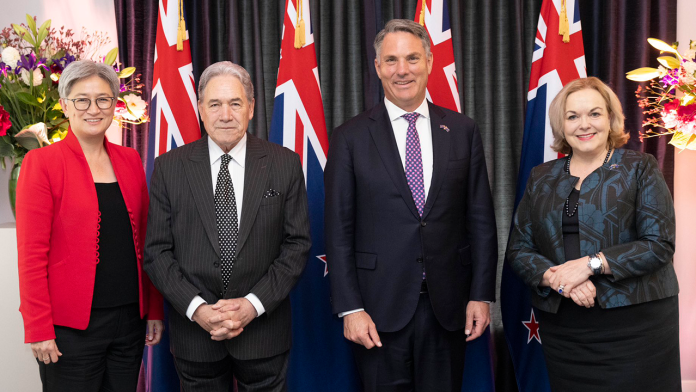New Zealand and Australia are discussing closer military cooperation after recent Chinese naval drills near their waters. On Saturday, the leaders met in Queenstown, New Zealand, for their second annual bilateral summit. Prime Minister Christopher Luxon hosted Australian Prime Minister Anthony Albanese to talk about stronger defence ties amid growing regional tensions.
Luxon called Australia New Zealand’s “only ally” and stressed the need for closer cooperation. “We have focused heavily on interoperability with Australia. Our aim is to act as a force multiplier,” he told reporters. He added that the two countries want to operate as a unified Anzac force in the region. This refers to the Australian and New Zealand Army Corps from World War I.
Regional security concerns following Chinese exercises
This meeting followed a live-fire naval exercise by China in the Tasman Sea last February. The exercise forced commercial airlines to change their flight paths. China’s navy rarely moves so far south. The mission showed Beijing’s expanding military reach.
Last month, Albanese raised concerns about the lack of warning before the exercise. He spoke to Chinese President Xi Jinping during a visit to Beijing. Xi responded by pointing to Australia’s own naval operations in the disputed South China Sea.
In a joint statement, the two prime ministers said the strategic environment has become unpredictable. They said their alliance remains vital to protecting shared regional interests. They also noted progress in deepening defence cooperation over the past year.
Defence modernisation and strategic partnerships
Although the statement did not name China, the leaders confirmed they discussed their main trading partner. “Geostrategic competition between major powers is a topic Australia and New Zealand often discuss,” Albanese said.
Luxon said both countries follow a similar approach in dealing with China. “China is a major global power, and engagement is important,” he said. “We have a mature dialogue recognising our differences in history, systems, and values. Good partners should openly discuss these.”
In April, Luxon announced plans to improve the New Zealand Defence Force’s combat capabilities. Defence spending will double to more than 2% of GDP, up from about 1% over the past two decades.
In addition, Japanese warships visited New Zealand on Friday for the first time in nearly 90 years. This shows Tokyo’s growing strategic interest in the South Pacific.
Australia recently confirmed that Japanese firm Mitsubishi Heavy Industries will build 11 naval frigates in a $6.5 billion contract. Australia is also expanding its defence with a submarine deal involving the US and the UK. Under the AUKUS partnership, Australia will get eight nuclear-powered submarines using US technology. The programme may cost up to $245 billion.
US President Donald Trump has urged Western nations to increase defence budgets and reduce reliance on US security.
Responding to this, Albanese said on Saturday, “If there is a case for increasing defence spending, then we are doing so.”
